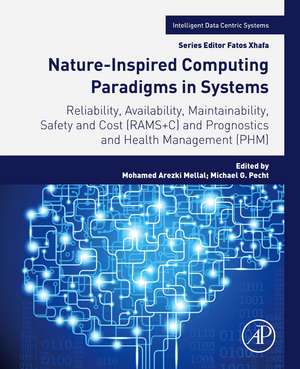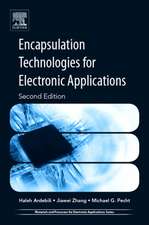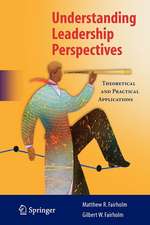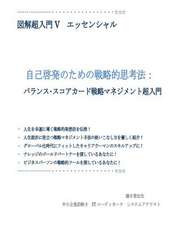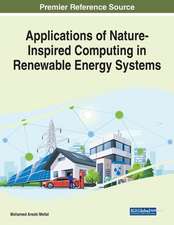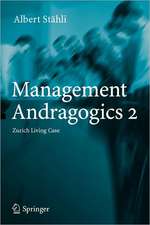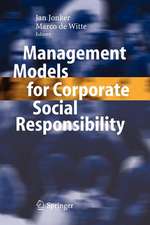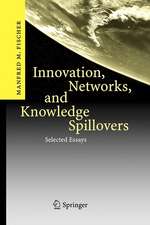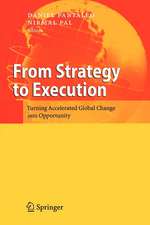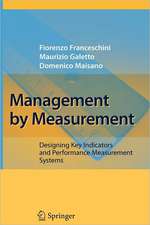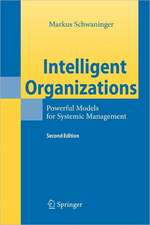Nature-Inspired Computing Paradigms in Systems: Reliability, Availability, Maintainability, Safety and Cost (RAMS+C) and Prognostics and Health Management (PHM): Intelligent Data-Centric Systems
Editat de Mohamed Arezki Mellal, Michael G. Pechten Limba Engleză Paperback – 18 iun 2021
The book addresses the issue of integration and interaction of the bioinspired techniques in system dependability computing so that intelligent decisions, design, and architectures can be supported. It brings together these emerging areas under the umbrella of bio- and nature-inspired computational intelligence.
The primary audience of this book includes experts and developers who want to deepen their understanding of bioinspired computing in basic theory, algorithms, and applications. The book is also intended to be used as a textbook for masters and doctoral students who want to enhance their knowledge and understanding of the role of bioinspired techniques in system dependability.
- Provides the latest review
- Covers various nature-inspired techniques applied to RAMS+C and PHM problems
- Includes techniques applied to new applications
Din seria Intelligent Data-Centric Systems
- 20%
 Preț: 424.07 lei
Preț: 424.07 lei - 20%
 Preț: 503.54 lei
Preț: 503.54 lei - 9%
 Preț: 525.19 lei
Preț: 525.19 lei - 33%
 Preț: 489.02 lei
Preț: 489.02 lei - 20%
 Preț: 494.26 lei
Preț: 494.26 lei - 33%
 Preț: 562.67 lei
Preț: 562.67 lei - 23%
 Preț: 603.19 lei
Preț: 603.19 lei - 24%
 Preț: 599.28 lei
Preț: 599.28 lei - 20%
 Preț: 645.83 lei
Preț: 645.83 lei - 20%
 Preț: 628.61 lei
Preț: 628.61 lei - 27%
 Preț: 594.74 lei
Preț: 594.74 lei - 27%
 Preț: 594.67 lei
Preț: 594.67 lei - 24%
 Preț: 572.25 lei
Preț: 572.25 lei - 27%
 Preț: 684.18 lei
Preț: 684.18 lei - 36%
 Preț: 558.65 lei
Preț: 558.65 lei - 35%
 Preț: 622.22 lei
Preț: 622.22 lei - 22%
 Preț: 644.04 lei
Preț: 644.04 lei - 24%
 Preț: 558.99 lei
Preț: 558.99 lei - 23%
 Preț: 767.48 lei
Preț: 767.48 lei - 23%
 Preț: 585.28 lei
Preț: 585.28 lei - 24%
 Preț: 670.69 lei
Preț: 670.69 lei - 33%
 Preț: 589.10 lei
Preț: 589.10 lei - 24%
 Preț: 584.07 lei
Preț: 584.07 lei - 33%
 Preț: 630.43 lei
Preț: 630.43 lei - 33%
 Preț: 626.78 lei
Preț: 626.78 lei - 24%
 Preț: 669.74 lei
Preț: 669.74 lei - 33%
 Preț: 545.49 lei
Preț: 545.49 lei - 33%
 Preț: 735.21 lei
Preț: 735.21 lei - 33%
 Preț: 705.47 lei
Preț: 705.47 lei - 33%
 Preț: 735.19 lei
Preț: 735.19 lei - 33%
 Preț: 791.24 lei
Preț: 791.24 lei - 20%
 Preț: 754.02 lei
Preț: 754.02 lei - 33%
 Preț: 794.66 lei
Preț: 794.66 lei - 33%
 Preț: 846.77 lei
Preț: 846.77 lei - 22%
 Preț: 575.47 lei
Preț: 575.47 lei - 33%
 Preț: 546.26 lei
Preț: 546.26 lei - 22%
 Preț: 919.72 lei
Preț: 919.72 lei - 28%
 Preț: 538.47 lei
Preț: 538.47 lei - 23%
 Preț: 586.14 lei
Preț: 586.14 lei - 32%
 Preț: 503.92 lei
Preț: 503.92 lei - 31%
 Preț: 562.02 lei
Preț: 562.02 lei - 31%
 Preț: 561.08 lei
Preț: 561.08 lei - 20%
 Preț: 926.96 lei
Preț: 926.96 lei
Preț: 510.04 lei
Preț vechi: 744.86 lei
-32% Nou
Puncte Express: 765
Preț estimativ în valută:
97.59€ • 101.91$ • 80.59£
97.59€ • 101.91$ • 80.59£
Carte tipărită la comandă
Livrare economică 08-22 aprilie
Preluare comenzi: 021 569.72.76
Specificații
ISBN-13: 9780128237496
ISBN-10: 012823749X
Pagini: 144
Dimensiuni: 191 x 235 x 14 mm
Greutate: 0.26 kg
Editura: ELSEVIER SCIENCE
Seria Intelligent Data-Centric Systems
ISBN-10: 012823749X
Pagini: 144
Dimensiuni: 191 x 235 x 14 mm
Greutate: 0.26 kg
Editura: ELSEVIER SCIENCE
Seria Intelligent Data-Centric Systems
Cuprins
Optimization
1. RAMS+C (reliability, availability, maintainability, safety and cost)
2. Optimal design
3. Diagnostic
4. Resilience and vulnerability
5. Prognostics and Health Management (PHM)
6. Risk assessment and mitigation
7. Faults
8. Obsolescence
9. Lifetime and lifecycle prediction
Methods of interest include, but are not limited to
10. Genetic algorithms
11. Particle swarm optimization
12. Differential evolution
13. Cuckoo algorithms
14. Artificial bee colony
15. Ant colony optimization
16. Artificial neural networks
17. Brain
18. Inspired computing
19. Hybrid techniques
1. RAMS+C (reliability, availability, maintainability, safety and cost)
2. Optimal design
3. Diagnostic
4. Resilience and vulnerability
5. Prognostics and Health Management (PHM)
6. Risk assessment and mitigation
7. Faults
8. Obsolescence
9. Lifetime and lifecycle prediction
Methods of interest include, but are not limited to
10. Genetic algorithms
11. Particle swarm optimization
12. Differential evolution
13. Cuckoo algorithms
14. Artificial bee colony
15. Ant colony optimization
16. Artificial neural networks
17. Brain
18. Inspired computing
19. Hybrid techniques
